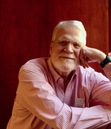Mark Scott Smith's Blog: Enemy in the Mirror, page 54
September 10, 2020
Korean War Draft Age Lowered From 21 to 18 Years
With WWII already begun in Europe and Asia, Congress narrowly passed the first peacetime draft in U.S. history.
President Franklin Delano Roosevelt signed the Selective Training and Service Act into law in September 1940.
All males of ages 21 to 36 were required to register for the draft.
The Act expired in March 1947, but President Harry S. Truman pushed for an extension of the draft and Congress reenacted the Selective Service Act in June 1948. Experiencing an overload of volunteers, the Selective Service System implemented a “draft holiday” in early 1949 with expiration due in June 1950.
With the onset of the Korean war in June 1950, Congress extended the act for another year. This time all males aged 18-26 were required to register for the draft. The Act was reauthorized in 1951 as the Universal Military Training and Service Act.
During the Korean War > 1.5 million men were inducted into the armed services. An additional 1.5 million were inducted between 1954 and 1961.
Source: Encyclopedia Britannica
The post Korean War Draft Age Lowered From 21 to 18 Years appeared first on Enemy in the Mirror.
September 7, 2020
Dennis the Menace Comic Strip
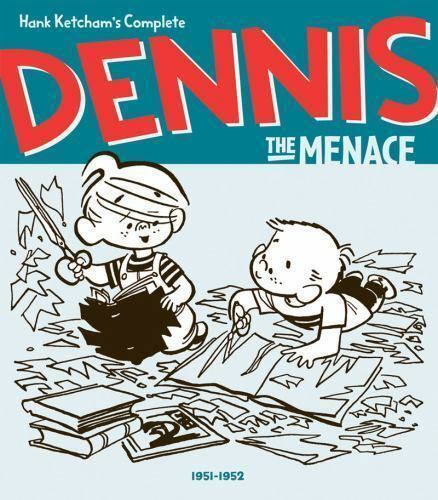 eBay
eBayDennis the Menace debuted in 1951 as a daily, syndicated newspaper comic strip that was originally created, written, and illustrated by Hank Ketcham.
Today the strip is written and drawn by Ketcham’s former assistants, Marcus Hamilton, Ron Ferdinand and his son Scott Ketcham.
 Pinterest
PinterestThe comic strip became so successful that it was adapted to other popular media, including several television shows, both live-action and animated, and several feature films.
The post Dennis the Menace Comic Strip appeared first on Enemy in the Mirror.
September 3, 2020
Chinese PLA and UN Forces Ping-Pong Back & Forth
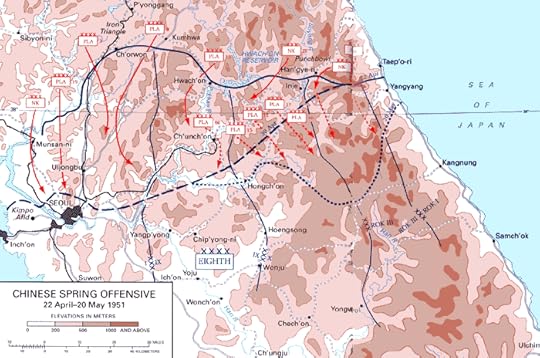
May 16, 1951 – Chinese Communist Forces launch a second offensive in Korea and gain up to 20 miles of territory.
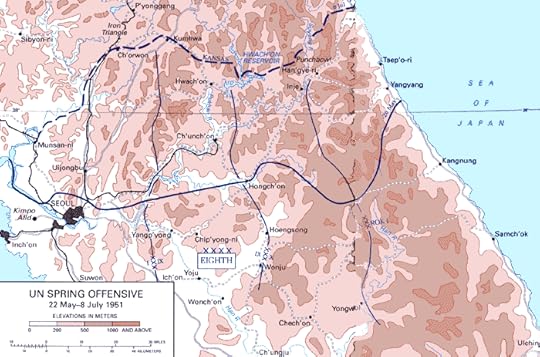
May 21, 1951 – The U.S. Eighth Army counterattacks to drive the Communist Chinese and North Koreans out of South Korea.

Mid-June, 1951 – UN forces advance approximately 2–6 miles north of the 38th Parallel. With the start of ceasefire negotiations underway, the UN advance stops on the Kansas–Wyoming Line. Despite some limited attacks, this remains the frontline through 2 more years of stalemate.

July 13, 1951 – Truce talks between the UN and the communists begin at Kaesŏng. However, fighting continues for two more years.
“The defeat of the Communist advance into South Korea and the restoration of a firm defensive line roughly along the 38th Parallel decided the outcome of the war and guaranteed the future of South Korea. U.S. and UN resolve in the subsequent summer fighting brought the Chinese and North Koreans to the peace table. The American response to the shock of the Chinese intervention evolved into a firm determination to limit the objectives of the war to the continued existence of South Korea.“
Source: U.S. army Center of Military History
The post Chinese PLA and UN Forces Ping-Pong Back & Forth appeared first on Enemy in the Mirror.
August 31, 2020
The Catcher in the Rye – J.D. Salinger
The Catcher in the Rye written by the enigmatic recluse J.D. Salinger was first published in serial form in the New Yorker magazine in 1945–1946, then as a novel in 1951.
 J.D. Salinger – Wikipedia
J.D. Salinger – WikipediaNarrated from the point of view of the young Holden Caulfield, the novel was originally intended for adults, but is often read by adolescents for its themes of angst and alienation, and as a critique on superficiality in society.
Translated widely, the novel has sold more than 65 million copies worldwide.
Source: Wikipedia

The post The Catcher in the Rye – J.D. Salinger appeared first on Enemy in the Mirror.
August 27, 2020
President Truman Relieves Gen MacArthur of Command
With the UN military situation in Korea improving in early 1951, President Harry S. Truman was contemplating offering a peace negotiation to Communist China.
However, in late March 1951 General Douglas MacArthur independently challenged China to admit defeat, thereby simultaneously challenging both China and President Truman. Truman’s proposed peace negotiation announcement was then shelved.
In April 1951 the Republican leader in the House of Representatives read aloud a letter from MacArthur that was critical of Truman’s Europe-first policy and limited-war strategy. The letter concluded with:
It seems strangely difficult for some to realize that here in Asia is where the communist conspirators have elected to make their play for global conquest, and that we have joined the issue thus raised on the battlefield; that here we fight Europe’s war with arms while the diplomats there still fight it with words; that if we lose the war to communism in Asia the fall of Europe is inevitable, win it and Europe most probably would avoid war and yet preserve freedom. As you pointed out, we must win. There is no substitute for victory.
In April 1951 President Truman relieved General MacArthur of his command.
In 1956 President Truman wrote: If there is one basic element in our Constitution, it is civilian control of the military. Policies are to be made by the elected political officials, not by generals or admirals. Yet time and again General MacArthur had shown that he was unwilling to accept the policies of the administration. By his repeated public statements he was not only confusing our allies as to the true course of our policies but, in fact, was also setting his policy against the President’s… If I allowed him to defy the civil authorities in this manner, I myself would be violating my oath to uphold and defend the Constitution.
General Source: Wikipedia
The post President Truman Relieves Gen MacArthur of Command appeared first on Enemy in the Mirror.
August 24, 2020
Commonwealth Forces in Battle of Kapyong
In April 1951 UN forces fought the Chinese Peoples Volunteer Army at the Battle of Kapyong in one of the most famous actions fought by the Australian, New Zealand and Canadian armies in the Korean War.
In the battle, occurring during the Chinese Spring Offensive, the 27th British Commonwealth Brigade blocked the advance of the Chinese Army on a key route south to recapturing Seoul.

Just two battalions off the Commonwealth Brigade stopped an entire Chinese division during the hard-fought defensive battle.
The post Commonwealth Forces in Battle of Kapyong appeared first on Enemy in the Mirror.
August 20, 2020
Literature During the Korean War
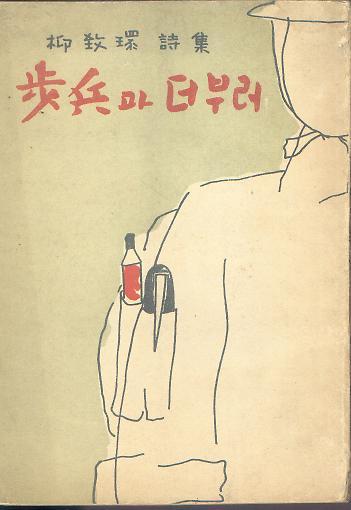
Together with the Foot Soldiers 步兵과 더부러
Yu Ch’ihwan (1951)
The pen we carry to fight should, like grenades, field artillery, flame throwers and the atomic bomb become a new weapon
Ch’oe Sangdŏk (1901-1971)
“After WWII Korean writers searched for a new function for literature which would undo culture from the remnants of colonization, and simultaneously strengthen the nation. Some writers argued that socialist realist literature would suit the needs of postcolonial Korea, while others started to propagate their vision of a so-called “pure literature” (sunsu munhak).
In tandem with the political circumstances on the Korean peninsula, these two aesthetic doctrines would become the most dominant, and would eventually become directly linked to one of the two hegemonic political ideologies: Communism and Democracy…”
Source: Wit, Jerôme de. Writing under wartime conditions : North and South Korean writers during the Korean war (1950-1953).
For South Korean writers during the Korean War, nationalism and determining who represented the moral highground of the Korean nation formed an important battlefield. In their stories South Korean writers asserted that North Korean politicians and army officers had given up all rights to be part of the Korean nation by adhering to their “mistaken” (Communist) ideology. Meanwhile the common North Korean citizen (including the citizen soldier) was a victim of this group in power and was treated like a slave.
Source: 1950s | Korean Literature Blog
After the partition between north and south, North Korea’s subsequent literary tradition was shaped and controlled by the State. The “Guidelines for Juche Literature”, published by the official Choson Writers’ Alliance, emphasized that literature must extoll the country’s leader. Only members of the Writers’ Alliance are authorized to have their works published.
Reading is a popular pastime in North Korea, where literacy and books enjoy a high cultural standing, elevated by the regime’s efforts to disseminate propaganda as texts. Because of this, writers are held in high prestige.
Source: Wikipedia
North Korean literature is virtually nonexistent in English translation outside of North Korea.
In contrast, a substantial body of South Korean literature has been translated. Source: B. Fulton
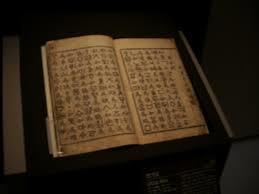 Wikipedia
WikipediaWRITERS
The post Literature During the Korean War appeared first on Enemy in the Mirror.
August 17, 2020
Chinese Ground Offensive Spring 1951
In April 1951 the Chinese Peoples Volunteer Army (PVA) launched the first phase of its Spring Offensive with three field armies totaling 700,000 men against the U.S. I Corps and US IX Corps.
In May 1951, the PVA and Korean People’s Army(KPA) launched the second phase of their Spring Offensive against the Republic of Korea (ROK) forces and US X Corps in the east.
Although initially successful, PVA and KPA advances were halted by late May.
At the end of May 1951, US Eighth Army counterattacked the overextended, exhausted PVA/KPA forces, inflicting heavy losses.
Main source: Chinese Spring Offensive
The post Chinese Ground Offensive Spring 1951 appeared first on Enemy in the Mirror.
August 13, 2020
Chinese Spring Offensive Air War
The Air Plan
After their New Years’ offensive, the Chinese People’s Volunteer Army high command decided to use the People’s Air Force in support of future ground operations. In preparation for this move, an air-ground training conference was held in Mukden.
By March 1951, in addition to more MIG-15s, the Chinese had acquired enough Ilyushin (IL-10) ground-attack planes to equip two air regiments.
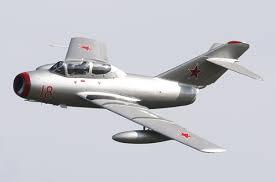 MIG-15 – Wikimedia
MIG-15 – Wikimedia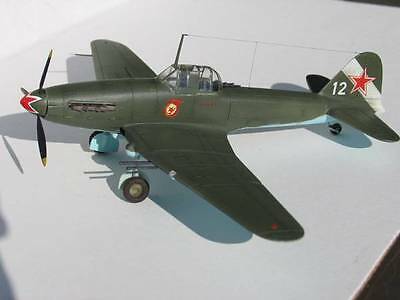 Ilyushin (IL-10) ground-attack plane – Flickr.com
Ilyushin (IL-10) ground-attack plane – Flickr.com
Fearing UN retaliation on Chinese bases, the People’s Air Force was forbidden to fly attack missions out of Manchuria against UN troops and installations. Airfields for support aircraft were therefore developed in North Korea.
The Chinese air commander Liu Ya-lou planned to:
establish air superiority over northwestern Korearepair and improve air facilities in the protected region restore forward airfields near the 38th parallel – Since the MIG-15s and IL-10s were short-range aircraftAfter the U.S. the Fifth Air Force demolished its forward fields at Kimpo and Suwon during the New Year’s offensive and redeployed all jet fighters to Japan, U.S. jets’ range was too short to maintain air superiority in the far northwest.

The Chinese People’s Air Force then assumed control of the air between the Yalu and Ch’ongch’on rivers.

By the first week of March 1951, the Suwon airfield was sufficiently repaired to allow jets to stage through it and reenter MIG Alley. By the end of the month, the U.S. Fifth Air Force was back in even competition with the Chinese air force.
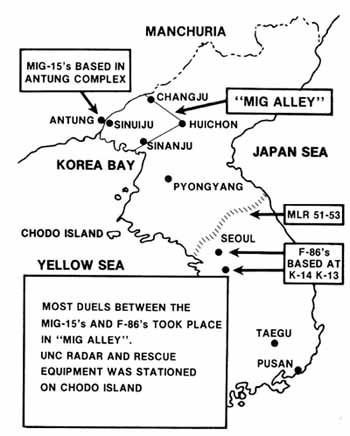
Wikipedia
Main source: Offensive1951
The post Chinese Spring Offensive Air War appeared first on Enemy in the Mirror.
August 10, 2020
Victor Borge Danish Pianist & Comedian
Victor Borge (born Børge Rosenbaum) was a Danish conductor and pianist whose comic renditions of piano concerts were widely popular in the United States and Europe.
Born to two concert musicians, Rosenbaum was a child prodigy pianist.
After classical training at the Royal Danish Academy of Music, Rosenbaum performed for several years as a concert pianist.
In the late 1920’s Rosenbaum began performing a comedy act which blended classical piano excerpts and humorous remarks.
In the 1930s Rosenbaum toured Europe with his comedic piano recitals—he often told anti-Nazi jokes.
When Nazi Germany occupied Denmark in 1940, Rosenbaum managed to escape to Finland via neutral Sweden.
Arriving in the U.S. in 1941, Rosenbaum spoke no English. But after learning English from movies, he assumed the stage name of Victor Borge and successfully adapted his comedy act to an American audience.
Starting in 1941 on Rudy Vallee‘s radio show, Borge went on to perform with Bing Crosby ‘s Kraft Music Hall program.
After winning Best New Radio Performer of the Year in 1942, Borge was offered many opportunities for film rolls with stars like Frank Sinatra.
The Victor Borge Show began on NBC in 1946.
Main source: Wikipedia
The post Victor Borge Danish Pianist & Comedian appeared first on Enemy in the Mirror.
Enemy in the Mirror
I began by posting events around the turn This website www.enemyinmirror.com explores the consciousness, diplomacy, emotion, prejudice and psychology of 20th Century America and her enemies in wartime.
I began by posting events around the turn of the 20th century as I was researching my first novel about the Pacific War. I continued through WWII for my second novel about the Battle of the Atlantic. Now I am beginning to look at the Cold War as I gather information for my next novel about the Korean War. ...more
- Mark Scott Smith's profile
- 7 followers



